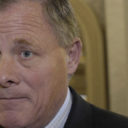The Senate will take another stab at the apple Sunday and attempt to find another solution to end the impasse after Democrats rejected a proposal by Maine Republican Sen. Susan Collins that had bipartisan support.
Leaders of the Democratic-led Senate rejected the proposal to reopen the government and raise the debt ceiling Saturday before going to Pennsylvania Avenue to meet with President Obama at the White House.
Sen. Collins appeared hopeful that Democrats may be open to reviving the plan after Democrats sat for a 75-minute meeting.
“Despite [Senate Majority Leader] Senator Harry Reid’s unfortunate dismissal of the 6-point plan, …. it continues to attract bipartisan support,” Collins said. “Six Senate Republicans and six Senate Democrats met twice today to discuss how we could move forward with the plan or some version of it. These meetings were constructive and give me hope that a bipartisan solution … is within our reach.”
Reid rejected the plan outright — which contained funding for the government for six months and increasing the federal debt limit through January — because the spending level of $967 billion next year was too low
Collins’ plan also calls for a two-year delay on ObamaCare’s medical device tax and requires income verification for Americans seeking subsidies for ObamaCare.
“Susan Collins is one of my favorite senators, Democrat or Republican,” Reid said. “I appreciate her effort, as always, to find a consensus. But the plan that she suggested … is not going to any place at this stage.”
The upper chamber also failed the get the necessary 60 votes on a bill to increase the debt limit through 2014 that was “clean” of Republican demands for spending cuts or changes to ObamaCare. At this point, questioning Harry Reid and the Democrats’ decision-making process is more than valid. If the Senate cannot even pass a so-called “clean” bill, then what leverage do they have to force the House to take a similar vote, where it is even more likely to fail.
In the Republican-controlled House, negotiations ended abruptly when Republicans refused to let Democrats vote on a bill to reopen the government, which resulted in an exchange between a staffer from each party.
“They amended the rules so only Majority Leader Eric Cantor can put something on the floor to open the government,” said Maryland Democratic Rep. Steny Hoyer, the House minority whip.
Earlier in the day, House Speaker John Boehner told his caucus in a closed-door meeting that he and the president still have no deal.
“The Senate needs to hold tough,” Rep. Greg Walden, R-Ore., said Boehner told House GOP lawmakers. “The president now isn’t negotiating with us.” The White House rejected a House plan to open the government for just six weeks.
The partial government shutdown kicked in Oct. 1, after lawmakers failed to reach a temporary spending bill. And the federal government is projected to miss the debt ceiling deadline on Thursday unless Congress increases the federal government’s borrowing limit.
Still, Senate Majority Leader Harry Reid and Minority Leader Mitch McConnell are still keeping an open dialogue.
“The only thing that’s happening right now is Sen. Reid and Sen. McConnell are talking,” said Texas Republican Sen. John Cornyn. “And I view that as progress.”
White House Press Secretary Jay Carney said early Saturday: “Congress must do its job and raise the debt limit to pay the bills we have incurred and avoid default. It is unfortunate that the common sense, clean debt limit increase proposed by Senate Democrats was refused. … This bill would have taken the threat of default off the table.”






